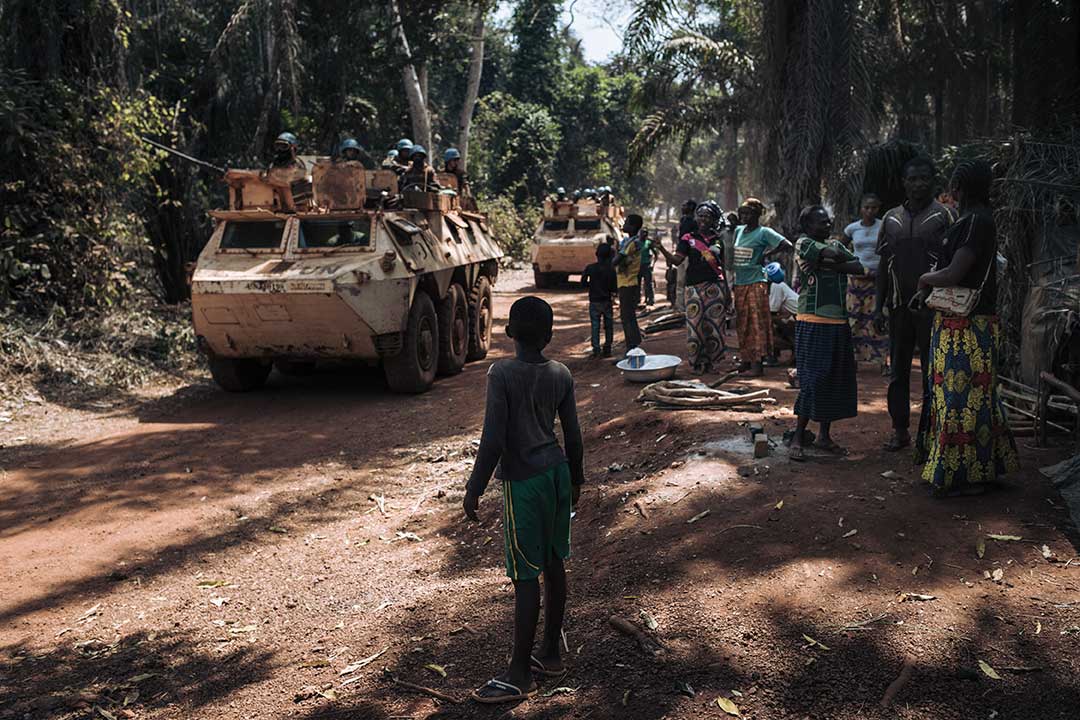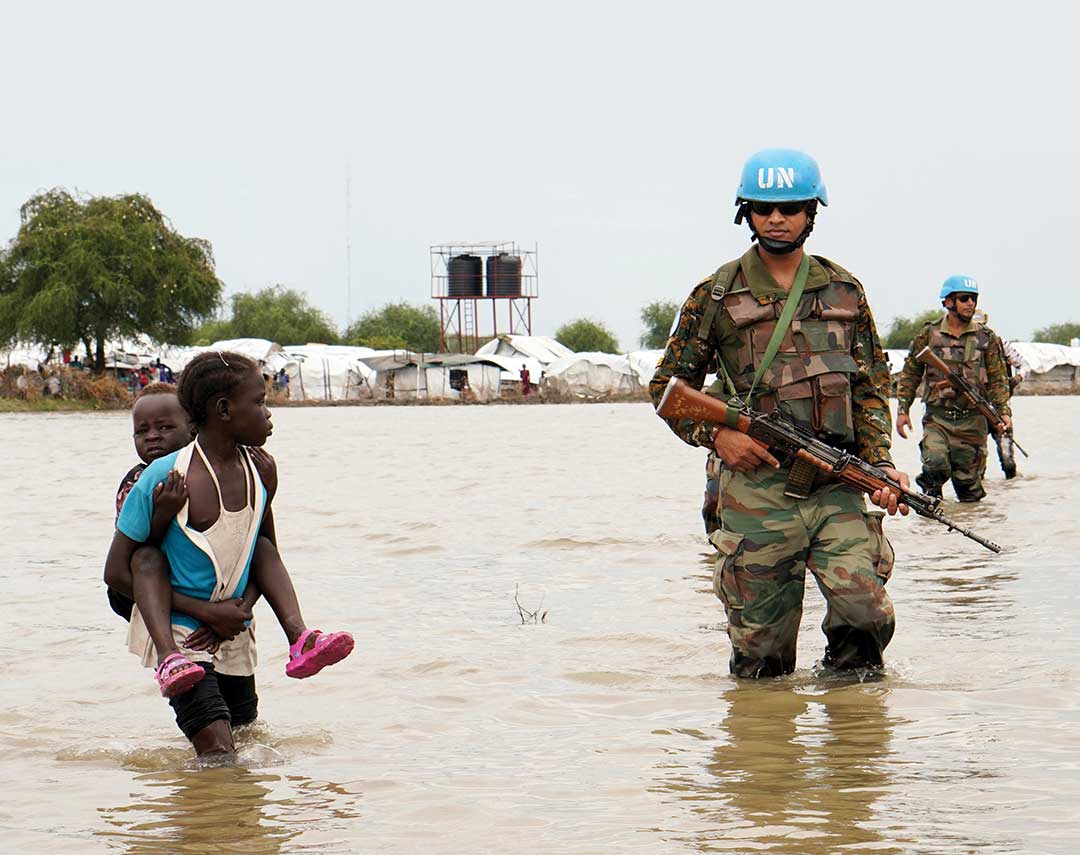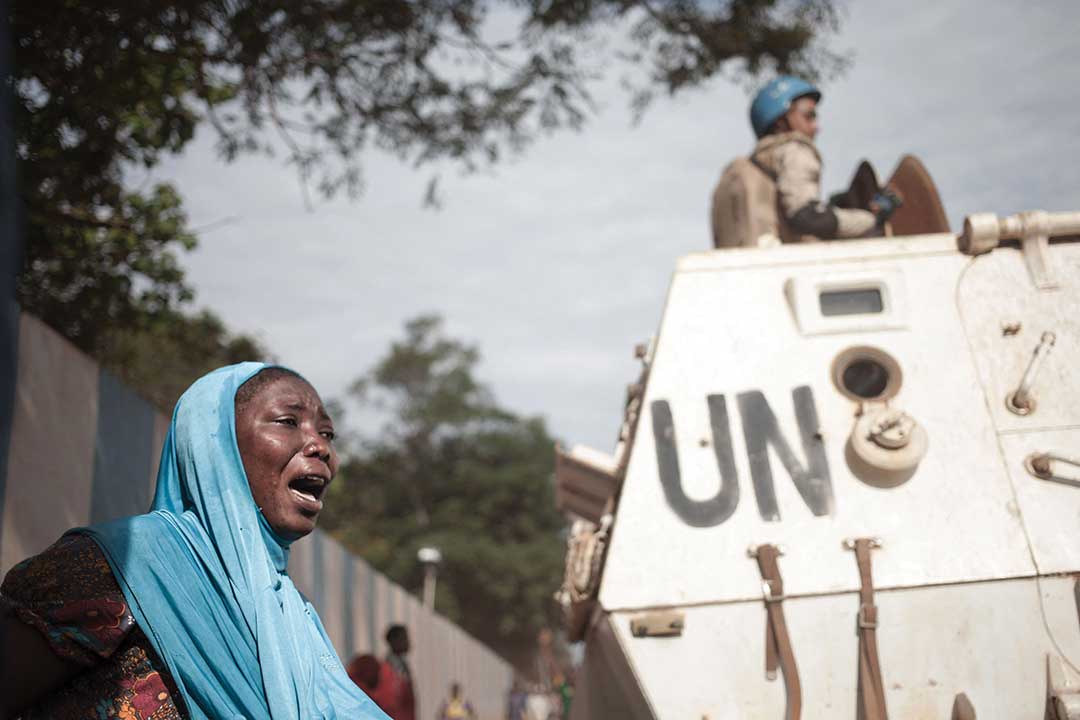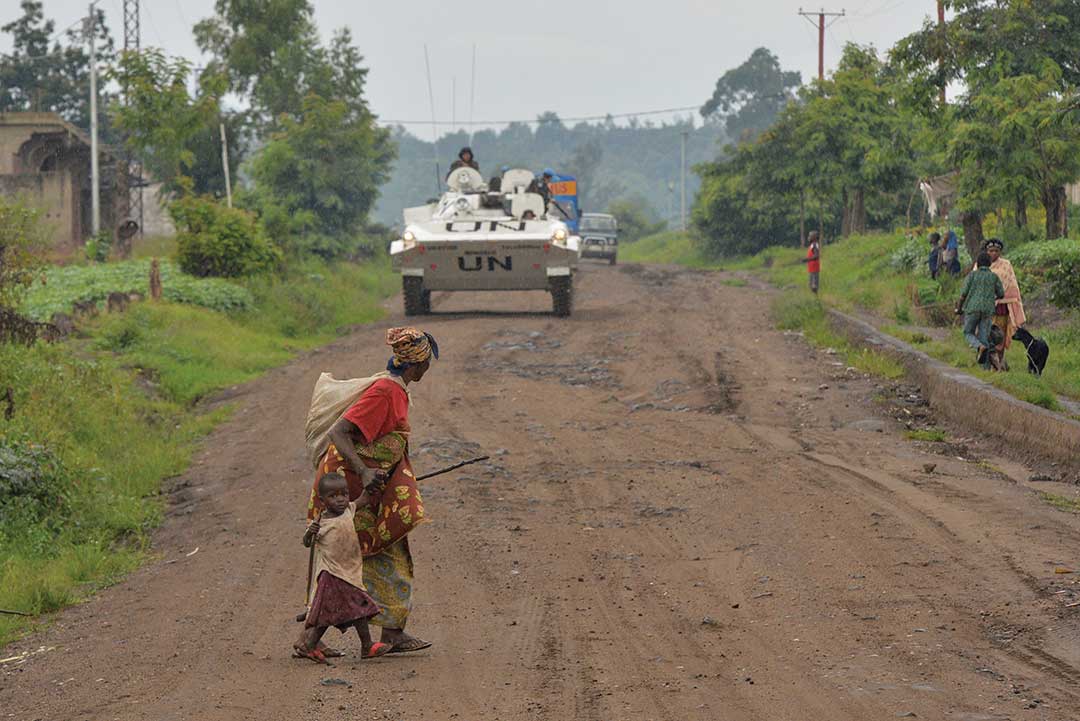Peacekeeping That Puts People First
Protests Directed at U.N. Peacekeepers Put Missions at Risk. Experts Share Ways to Win Back the Support of Host Communities.
ADF STAFF
Maj. Gen. Emmanuel Kotia remembers being deployed to Lebanon in 2006 to command the Ghanaian battalion of the U.N. Interim Force in Lebanon (UNIFIL).
Some southern villages in his area of responsibility had been occupied and badly damaged during the war. Residents had been forced to flee, and their anger as they returned home was palpable.
“They were devastated,” he told ADF. “When people came back to the villages, they didn’t want to see any U.N. vehicle passing through the road.” He said civilians believed the U.N. should have done more to prevent attacks.
Kotia decided to go before the traditional leaders known as mukhtars and offer assistance from his battalion. “I said ‘Look, we are here to support you. Whatever could have happened, happened, but let’s forgive and forget,’” he recalled. “So, I was drinking coffee with them, chatting with them, going to them and it probably changed their minds.”
The second time he met with the local leaders, the discussion was more open. Whereas previously they insisted they did not want or need U.N. assistance, now they conceded they needed just one bit of help. They asked the U.N. to use its equipment to move a container that was blocking a road. Kotia immediately made it happen.
That small gesture, he said, opened the door to a stronger civil-military partnership. Before long, the U.N. was offering the community clean water from its tanker trucks and health care services through its medical personnel.
“One of the fundamental issues that peacekeeping missions should have as part of their mandate or concept of operations is that the life of the civilians they are protecting must be improved,” Kotia said. “If there is no improvement of the quality of life, the peacekeeping operation will not be welcomed.”
Kotia has written a book titled “Ghana Armed Forces in Lebanon and Liberia Peace Operations,” and served in missions in Cambodia, the Democratic Republic of the Congo (DRC), Liberia, Rwanda, Western Sahara and elsewhere. He said understanding civil-military relations in peacekeeping is more important than ever. The U.N. has faced violent protests against its presence in the DRC and Mali. Kotia and other experts offered guidance on how to win acceptance from host communities and make missions more effective.

Manage Expectations
Although experts say it is important for the population to see benefits from a peacekeeping operation, they also caution that people need to know the limits of peacekeepers’ capabilities and mandate.
Often, civilians become angry because there is a gap between what peacekeepers can do and what civilians expect from them.
“We’ve seen peacekeepers return and say the community expected us to respond to every issue: medical supplies, food, access to transportation, dealing with infrastructure, fighting the people they perceive as a threat,” Ouiem Chettaoui, a senior program officer working on conflict management training for peacekeepers at the U.S. Institute of Peace (USIP), said during a webinar.
Communicating what a mission can and cannot do is key. This requires community engagement through events such as public meetings, television and radio broadcasts, and other outreach efforts. “If the expectation is for the peacekeeping mission to resolve problems that are outside or beyond its capacity, that creates an issue of trust,” Chettaoui said. “So, managing expectations is essential, and targeted communication is essential.”
Chettaoui said every person in a mission must know the mandate and the mission’s objectives so he or she can communicate them clearly when interacting with the public. Effective public outreach also helps the mission counter misinformation, which can poison the relationship between civilians and peacekeepers.
“Everybody needs to know exactly what the talking points are around the mission’s goals and what it can reasonably achieve in that moment,” Chettaoui said.

Find Quick-Impact Projects
Early in a mission it is important for the population to see tangible benefits from the presence of peacekeepers. One way to do that is a “quick-impact project” that improves the lives of the public while also earning the peacekeepers credibility.
Kotia recalled the Italian contingent in UNIFIL facing stiff resistance to its presence. Villagers were shouting at the peacekeepers and hurling rocks at their vehicles. He advised the Italian commander to go to the local leaders and ask them what they needed, with an emphasis on something that could be completed fairly quickly.
It became apparent that the Lebanese needed road improvements and other assistance. The Italians were able to launch a road-refinishing project, and the civil-military dynamic completely changed. “This endeared them to the people,” Kotia said.
These quick-impact projects can be small, like drilling a well for fresh water, or can be more complex, like improving access to electricity or improving railroads. Demining is another vital need in many war-scarred countries. The key, say those who have led missions, is for the community to see the results.
“Peacekeeping operations must come up with strategies of quick-impact projects that will improve the lives of people in the quickest possible time,” Kotia said.
Embrace Accountability
Peacekeeping missions sometimes have lost credibility due to misdeeds such as sexual exploitation or violence against civilians. In other cases, their inability or unwillingness to act in the face of a threat to civilians fractured the relationship. In the eastern DRC, for example, instances when U.N. forces failed to intervene to stop rebel massacres became a rallying cry for protesters calling for an end to the mission.
“We need to strengthen our accountability mechanism as the United Nations,” Claudia Croci, a senior specialist at the United Nations Institute for Training and Research, said during a webinar. “If something doesn’t go in the right direction, I think we need to really pause for a second and try to figure out, ‘Why has this gone so wrong and what are we going to do to correct this?’ And show to the communities that there is an accountability system.”
This could include public forums in which the U.N. explains its actions and the concrete measures it is taking to improve. The U.N. interacts with the public through its joint protection teams, community alert networks and mission staff responsible for community outreach. Still, experts say, more can be done.

“If something goes wrong, it’s not just enough to say ‘Sorry, something went wrong,’ but showing that there are consequences, people are held accountable, that’s really important to avoid this situation,” Croci said.
In 2015, the U.N. issued its Policy on Accountability for Conduct and Discipline in Field Missions, strengthening punishments for personnel found to have committed abuses. For example, U.N. peacekeepers accused of firing live rounds at protesters outside a warehouse in Goma, DRC, in July 2022 were arrested, and the U.N. issued a formal apology calling the incident “unspeakable and irresponsible.”
“Stop and try to figure out why this happened, and if there was a mistake acknowledge there was a mistake,” Croci said. “We are humans, we can make mistakes. But acknowledge it.”
She added that an attitude of impunity or aloofness is a quick way for peacekeepers to be estranged from the population they are there to protect. “We would not accept it as individuals; why should we expect communities where we intervene, but are hosted, should accept it?”
Be Culturally Aware, Ready to Mediate
During his time in Lebanon, Kotia saw some peacekeepers breaking local taboos such as openly drinking alcohol. In a majority-Muslim country, this act could discredit the entire force in the eyes of civilians and make the U.N.’s work more difficult.
He said cultural education needs to be incorporated into predeployment training.
“The troops must study the environment, it must be explained to them and they need to know the customs of the people,” Kotia said. “That helps them to appreciate the type of people they are going to meet and how they can relate to them.”

The U.N. and the USIP are incorporating more real-life scenarios into the training offered to peacekeepers.
Chettaoui said such tools can lead to better civil-military interactions and promote alternative forms of conflict resolution such as mediation and collaborative problem-solving. This way, she said, the community will see that peacekeepers can mediate disputes rather than “close the gates if it gets too rough, or pull out the guns.”
“It is necessary to equip them with the tools of how to negotiate, how to mediate, how to resolve an issue without resorting to violence,” Chettaoui said.
Croci said that as the U.N. reforms its predeployment training, it is working to present peacekeepers with the types of charged, complex scenarios they will face when they are in the field.
“The training is directly linked to the experiences that they will live once they are deployed,” she said. “The concern was giving peacekeepers the practical tools to operate and make a difference once deployed. It’s not about theory … but how does this translate into your day-to-day work.”


Comments are closed.